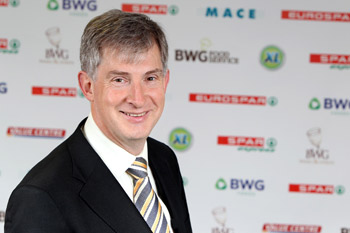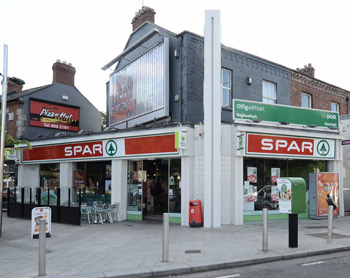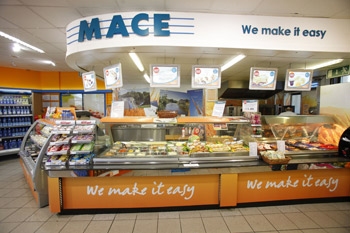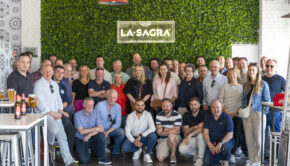Master of all trades

Managing director of BWG, Willie O’Byrne tells Fionnuala Carolan how the company has weathered the recession and of some major new initiatives afoot
11 July 2012
The day after this interview with Willie O’Byrne he was due to make a trip to the Aran Islands to see a newly renovated Spar store and witness the first contactless payment transaction to take place there. He spends around 40 days a year visiting retailers from Gortahork in Donegal to Dunmanway in Cork in order to keep in touch with the people who represent the business he manages.
As it turns out this is an ideal time for ShelfLife to chat with O’Byrne because BWG is just on the cusp of launching two major initiatives which will have significant effects on the business. With a new centralised ambient and alcohol business launching in Kilcarbery, Dublin this month and a chilled distribution centre at Kilshane Cross in Dublin getting off the ground, the company doesn’t appear to be sitting back and riding out the recession.
While BWG is best known as the operators of the Spar and EuroSpar brands there are seven businesses under the BWG banner; Spar, EuroSpar, Mace, XL, Value Centre, BWG Food Service and a wine and spirits business. Taking the retail brands into account there are 870 stores in total but O’Byrne says that grocery in itself doesn’t define the business because they are playing in so many different markets and he cites the deli and coffee businesses, the wines and spirits business and sales into on and off trade as other important elements.
Mixing it up
O’Byrne has had a very varied career to date with no shortage of ups and downs. A mechanical engineer by trade, his career has spanned three decades including stints working with Irish Distillers, Transair, Digiphone and BWG on two separate occasions. He jokes that he never had to take any garden leave as everytime he moved jobs, he also moved industry.
Despite this he was never phased by these big moves and says that you need a certain amount of “emotional intelligence and intellectual horsepower” to succeed in any kind of business and once you could apply this, you could be successful.
His relationship with BWG began when he took a job as a process engineer at Irish Distillers, Midleton Distillery back in the late eighties when BWG was part of Irish Distillers. He later decided to change course and became deputy to current CEO of BWG Leo Crawford when Crawford was finance director of Irish Distillers. In 1994 O’Byrne moved into the BWG arm of the business as the cash and carry director for Value Centre.
Three years later he left BWG and rejoined the company in 2008 as managing director of Mace. In the interim years he worked in the aviation and the mobile phone industry. He was CEO of Transair, a chartered airline, until the company was forced into liquidation. O’Byrne describes this as one of those times in life that you get your grey hairs! Following this he moved on to Digiphone where he spent eight years in various areas of the business.
Back to basics
While he was away from the grocery industry for 11 years O’Byrne had maintained strong links with BWG so when the company went to buy Mangan Wholesalers, one of main suppliers of Mace in the west of the country, he was an obvious choice to run the enlarged Mace funtion. Buying Mangans meant that BWG had national teritorial responsibility for Mace so BWG finally had an ability to develop and grow the Mace business on a national level.
His return to the world of grocery retailing was not as smooth as he would have imagined. He rejoined BWG on 15 September 2008, the day of the Lehman Brothers collapse, and what many would regard as the start of the worldwide recession. “Everybody had told me that all that was happening was a small bump in the road, nothing of consequence, so five years later I’m an older and wiser man! It was a tempestuous time in the grocery industry. With 30 years in business now, I’ve worked in companies where I’ve had to transition through change. In that sense a lot of those skills I had learned were put to very good use very quickly.
“In quarter four of 2008 the penny had dropped that this wasn’t a normal recession, but it was something much deeper than that.” He says they put in an early rationalisation plan across the business that included the consolidation of the cash and carry network from 34 to 22 branches and the consolidation of the delivered business centres from four to two. It also included addressing things like pay rises, pensions and bonuses.
“We were ahead of the game in terms of what needed to be done to make our business safe through recession and we were also very conscious of the fact that where the real fire power was needed was in the retail businesses themselves. In that sense we needed to get a new price and value agenda embedded with our retailers, we needed to present a much stronger competitive offer and in doing that we had to be very careful not to abandon our USPs.”
He insists that they were very careful not to cut back on investment in the brands and that the marketing spend was actually ramped up. “It was all about the business being mean and lean but you could fool yourself by taking a chunk out of your marketing spend and saying we are now spending less, but you’re not actually nurturing your brands and you’re not protecting your business.”
To demonstrate this he cites Spar’s product placement advertising with the RTÉ soap, Fair City, which is a three year deal worth €900,000.
Despite all the obstacles, just over a year after returning to the fold, O’Byrne took up the position of managing director of BWG in December 2009. He describes this appointment as an honour and a big responsibility to bear.
Ambient distribution
The most significant investment the company has embarked on since his tenure began, is to establish a national ambient distribution centre. The company is consolidating its Walkinstown, Limerick and Ashbourne operations into one major centre in Kilcarbery, Dublin. O’Byrne explains why they felt the need to go down this route. “As our businesss has consolidated and grown one of the problems has been that our warehouses don’t have rubber walls and we have spilled out over our in-house infrastructure and we’ve had to open up 3pl (third-party logistics) relationships with people like Primeline. And while Primeline has done an excellent job for us, it’s not an optimal arrangement where you have a certain amount of your business done in Ashbourne, Walkinstown, Limerick etc. So this has been the ultimate fix for us which is that we’ve got a box that is big enough to accommodate all our ambient business including our wines and spirits business.”
The first batch of stock will move into Kilcarbery on the first of August and deliveries out will begin on the first of September. “We will expect the full roll out to be completed by the end of October. It’s a fantastic, completely bespoke site. It’s 240,000 square foot and the size of three football pitches.”
He believes that there will be a significant benefit to retailers because they can combine deliveries of alcohol and ambient product that used to come from different warehouses.
While there will be job losses with the closure of the other warehouses O’Byrne is quick to say that net employment in BWG will grow. “There are going to be 109 people employed in Kilcarbery. All our Walkinstown team will move across and there has been interest expressed in Limerick by a number of employees to move. We are trying to look after them and the discussions are ongoing and sensitive but they are being held in an open and an honest way.”
Chilled distribution
Not only is the company rolling out a central distribution for ambient and alcohol it is also launching a new chilled development set up in April of this year in Kilshane Cross in North Dublin, in association with Donnelly’s Fruit and Veg.
The company was reluctant to go down this route initially but overall industry changes have meant that it has become necessary. Also he says that the new road network has been a huge game changer.
“Although BWG has always favoured a central billing model over central distribution, that still remains our preferred approach. However due to industry changes such as Dunnes Stores moving to central distribution, changes needed to be made to the BWG model as suppliers would not be willing to drive around for just BWG stores,” he says.
“We judged that it was the right time for us to consolidate what I’d call the main players in the chilled space in the same facility so what we did was we entered into a partnership with Donnelly’s Fruit and Veg and we set up an operation in Kilshane Cross in North Dublin in a dedicated facility and what we’re offering is a consolidated distribution of a wide range of chilled brands. What we’re not getting into, is the distribution of milk and where brand owners’ preference is direct store distribution, we’re happy for them to do that.”
Morris Brothers acquisition
A third exciting development of recent times has been the acquisition of Donegal based Morris Brothers wholesalers in mid May. Morris Brothers has annual revenues of around €30m and the company services over 450 retail businesses across the North West of Ireland. This move will strengthen BWG’s existing wholesale operations, especially in the Donegal, Sligo, Cavan, Mayo and Roscommon regions.
A point that O’Byrne is keen to stress is that he believes in relation to Morris Brothers and the 2008 Mangans acquisistions, that when you buy the wholesaler you don’t buy the retailer.
“Retailers aren’t bought and sold. It’s a message that you need to get across very quickly or you’ll find that you haven’t bought very much. It’s certainly a learning that we are now putting to good use in the context of our converstaions with Morris Brothers’ retailers because they are at the early stages of having seen their wholesaler bought and as I say we are very respectful of the fact that by buying the wholesaler, we haven’t bought the retail businesses and retailers have their own choices and decisions to make.”
Store openings and revamps
While there has been a considerable slow down in c-store openings and revamps since the height of the boom, there is still some movement in these areas, according to O’Byrne. Spar was well-known for its high-spec revamps during the boom and it pushed the boat out when it came to high-end design concepts.
O’Byrne defends these decisions by saying that they were the right thing to do at the time. He mentions the high-spec Spar at Dublin Airport, opened 18 months ago, to demonstrate that these finishes are still relevant in certain cases.
“Spar for me is the gold standard of convenience retailing,” he says. “That accolade has been hard earned over the years and we’re not giving it up very easily. If you go back to the idea that price and value alone won’t actually do it for you, Spar’s DNA includes innovation, it brings a certain amount of sex to a convenience brand and it’s very important that we kept that in the mix and we’ve tried hard to keep that there.”
And what about stores that mightn’t be up to scratch. Does this bring the whole group down?
“Very much so,” he says. “In referencing Mace in this regard, it would have had some great stand out stores throughout the years but it would also have had a long tail where at the extreme ends of it the Mace sign was actually a fascia and the Mace offering was a very light one. What we’ve seen is that a lot of this has been tidied up by the natural forces of the laws of the jungle. And we have some very strong standards programmes across our brands, the Mace Excellence Scheme for instance. We took a decision to go mandatory on that two years ago and that has probably accelerated the demise of the long tail but it has also immeasurably raised the standards of the estate as a whole.”
Store closures
BWG has suffered store closures and losses over the recession but O’Byrne says that they have still won more than they have lost and that the company is definitely back in growth. “There is always movement. In terms of the competitive churn between competing brands we have won more than we have lost in that space and in the context of the overall number, the small drift is effectively the result of the consolidation in the industry.”
And the retailers who were in it for investment purposes? “There is no doubt that there was probably a lot more golf being played in the mid to late 2000s but what we’re seeing is that store owners are much more intimately acquainted with the stores, they are much more hands on, and to be honest what we have is a much better quality of retailer out there now.”
The rise of own brand
The recession has brought other changes to the industry too and the rise in the sale of own brand products has been a significant one. O’Byrne says that the company can leverage its international connection with Spar for access to ranges that the business probably wouldn’t justify the production of on its own. “When you look at the trends established by recession there is no doubt that it has been a big driver of own brand goods. And the fact that we have a very credible own brand range not just in Spar but also in Mace and to a lesser extent in XL and they are all very important building blocks in the business. Own brand is a big part of the whole price and value matrix.”
He sees the shift to own brand goods as a permanent one but believes there is room for both brands and own brand products in the marketplace. “Everyone accepts that we’re in a different place and a different country now. Some of those trends that were already established in other economies just accelerated the path. For example own brand is huge in the German and UK economies and they would have suffered much shallower recessions than we did.
“It’s important to say that own brand isn’t no brand. Own brand is in a sense trying to harness the power of the retail brands we’ve established and those brands would not work in the private label space if they did not already have a trove of trust and reputation.”
The company is also concerned with promoting Irish produce and it has recently piloted the Think Irish programme with EuroSpar Killiney being used as a showcase for it. This programme aims to make shoppers more aware of Irish goods in store.
Trade show
As we can see, life for Willie O’Byrne is far from quiet at present. While all the plans were going through for the new distribution centres, himself and his team were also busy organising a company trade show. For the second year running the company has held the show in Dublin’s Convention Centre. Retailers who attended the show were privy to special offers available on that day only and much of the ordering for the Christmas period took place. “We decided we’d do the trade show and go large on it. It had a massive impact and from our point of view the important thing was that we got our retailers to attend.” And attend they did with 735 stores represented and over 1,000 visitors on the day.
There is a definite air of ambition and energy about this man and his confidence in the longevity and success of the business is plain to see.
“Our ability to bank projects like Morris Brothers, Kilcarbery and Kilshane Cross, and the fact that we are emerging from recession and we are still in very good stead, is a testament to the strength of the company,” he says.
The idea of waiting for the economy to fully recover obviously has not crossed O’Byrne’s mind and he is very confident about the future of the business which it’s probably safe to say is looking pretty solid in his hands.

Spar Ranelagh, Dublin 6
News about BWG brands
Spar/EuroSpar
Spar has over 450 stores across Ireland with three different formats – Spar, Spar Express and EuroSpar. Spar has recently partnered with RTE’s ‘Kitchen Hero’ presented by Donal Skehan for a second series with a €200,000 investment. Spar International has just sponsored the The European Athletics Championships in Helsinki.
There are now 57 EuroSpars across the country. The most recent is in in Dunmanway, Co Cork and the company opened two Eurospars last year, one in Donegal and one in Milltown in Dublin.
Value Centre
There are 22 Value Centres nationwide that deal with clubs, pubs and restaurants and with BWG’s own symbol estate and other symbol estates. O’Byrne ran the Value Centre business back in the early 90s. Despite consolidation that business has grown both sales and share.

Mace Annacotty, Limerick
Mace
There have been 15 new Mace store openings this year so far. Mace has recently renewed its contract with Maxol for another five years which O’Byrne describes as “a big deal”. There is currently work ongoing around the innovation for the Maxol and Mace partnership.
XL
By the end of July there will be 17 new XL store openings this year so far. The company has a medium term objective to get to 200 stores which it is due to reach by summer’s end.



 Print
Print






Fans 0
Followers